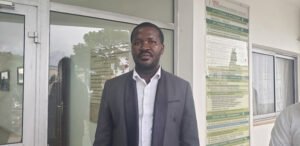Félicité Health Centre A hospital faced with unpaid bills from refugees and vulnerable patients
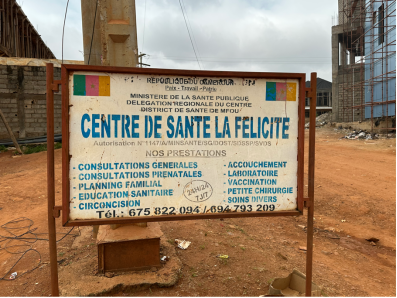
The Félicité Health Centre, located in the Mefou and Afamba division, Centre region, is facing a major challenge: unpaid bills from refugee patients, internally displaced persons and other vulnerable populations in Nkolanga’a. Despite the free services offered by the hospital, the lack of equipment and staff and the late delivery of medicines are hampering its progress and its ability to provide quality care to those who need it most.
The Félicité Health Centre is a veritable haven of care for the vulnerable populations of Nkolanga’a, receiving up to 50 patients a week and witnessing the birth of 12 to 15 new babies every month. Malaria accounts for 80% of the cases recorded, but the majority of these are refugees from the Central African Republic and internally displaced people from the Far North, North West and South West regions of Cameroon. The local population also benefits from the hospital’s services.
Because of the vulnerability of these disadvantaged groups, the health centre is forced to offer care at reduced cost, or even free of charge. This situation, while noble, is holding back the development of the hospital, which is struggling to cover its operating costs and provide adequate equipment. Unpaid patient bills are a major challenge, threatening the hospital’s financial viability.
The hospital also faces structural constraints, including ageing infrastructure and cramped premises. The treatment room, toilets and a mini-laboratory are located just opposite the main entrance to the reception area. The laboratory is housed in a narrow space that can barely accommodate a centrifuge and microscope. The lack of equipment, support and experts also hampers the quality of care provided. The hospital has six employees: four nurses, a midwife and a laboratory technician.
Faced with these challenges, the health facility is appealing to the government, non-governmental organisations, associations and groups to come to its aid and support the disadvantaged population of Nkolanga’a. It is essential to provide financial and material assistance to this hospital, which plays a crucial role in the region by offering essential healthcare to the most disadvantaged.
The situation at the Félicité Health Centre highlights the importance of solidarity and cooperation between the various stakeholders in guaranteeing access to healthcare for all, particularly vulnerable populations. Concrete steps need to be taken to provide financial support for this facility, so that it can continue to alleviate the suffering of the neediest people in Nkolanga’a.
Ingrid Kengne
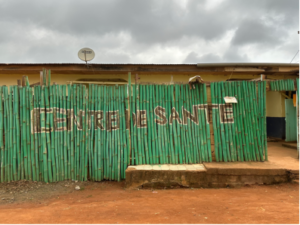
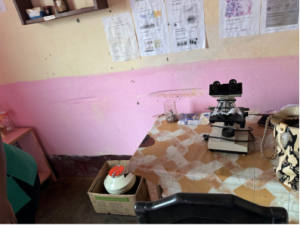

Interview
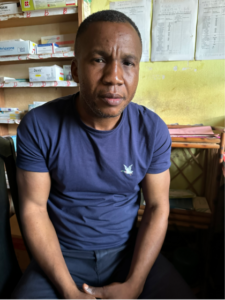
Mbega Antoine, founder of Félicité Health Centre
“We are calling on the Ministry of Public Health, NGOs and subsidies bodies to support and help an underprivileged centre to integrate, improve the living conditions of non-natives and the needy who live in our outlying area.”
Can your present your health center?
The Félicité health centre is located in Yaoundé IV, precisely at Nkolanga’a. So we are under the Mfou District. The centre was created in 2007. So the centre has existed for almost 14 years. It’s a centre whose aim is to promote the social framework in this environment, because we have cases and we’re in an area where we have a lot of destitute people who find themselves in our midst, which is why I’m talking about social action. And at these levels, we record cases of illnesses and pathologies, most often in our centre, but the most recurrent we experience is malaria, practically 70% of the cases we receive here. As far as the results of our activities are concerned, if we can talk about the Centre’s attendance figures, we are a centre that receives on an average 20 to 25 patients a week. We have several categories of patients that we admit here. There are those who are admitted for inpatient care and there are those who are admitted for outpatient care, i.e. those who come for ambulatory care and there are those who come for consultations and who are admitted. The assessment we are giving is not a constant assessment, it can be evolving as it can be diminishing, everything depends on the seasons, and everything depends on the periods, because diseases, as you already know in Africa, are generally experienced seasonally. We have epidemics, endemics, so these cases can be experienced in an approximate way to say that there are times when we have reached ceiling rates that average more than 40 patients per week when there is really intensive activity. But activities are a bit in disarray at the moment because attendance hasn’t been very recurrent recently and the season isn’t favourable, for a certain admission of care a bit like we’ve often been in the case of other seasons because the observation we have on the ground is that there are seasons when we do malaria cases, which go to the order of practically 70 to 80% of cases according to admissions here. And, these days the cases are not recurrent enough in this sense, there are cases of injuries, follow-ups that come externally so that on average we also have a lot of maternity cases. It’s true that there are many other centres and but centre doesn’t have a certain prestige as you can see but at district level it has a name, which is why we are a pilot centre in the area. We have a vaccination centre here, and all the other health centres get their supplies from us. So we already have a certain credibility at the district level thanks also to our excellence, our performance in terms of quality and care, and our respect for the rules imposed by the health centre district. So we’re making efforts to accommodate ourselves, we’ve paced ourselves to the programme that’s established by the Ministry and that’s an advantage and a privilege for us, which means that the district is already giving us a certain reputation in terms of our area of activity and within the radius. As far as treatment, care and follow-up are concerned, we also have a fairly qualified staff, 6 in number. So, here we have practically 2 state graduates, 1 principal graduate, 1 senior nurse, 1 midwife, 1 TMS for the laboratory, which makes a staff of 6 people. We also have 2 care assistants who support and assist them with monitoring and care.
Aren’t there any doctors?
No, to speak of doctors, we can have them by invitation when we have certain cases. There are cases where we have well-defined specialities, such as ophthalmology or dentistry, for example. In these cases, we call on people with these qualifications to come and carry out programmes based on the censuses and registrations that we carry out at our level. We can’t invite them for one or two cases, but once we’ve registered a certain number of people, that’s when we can invite them. When it comes to consultations, you have to understand that first of all we are a health centre, which means that we have limits, we work within limits, we provide primary and secondary care, so when it comes to in-depth care, it’s out of our hands. So we know our limit and we know where we can cap ourselves,
In concrete terms, what are the different services you offer?
Here we have prenatal consultations, PMI, family planning, an in-house laboratory for average cases, i.e. if we want to take a case of a patient who arrives to start administering care, we do what we call a basic check-up:So we have at least 4, 5 or 6 examinations that we carry out on the spot. For other examinations that we can’t carry out, we have more accredited centres in the area with which we work in synergy.
Is there water here for instance?
There’s water. This is SINEC
Speaking of the centre, how many beds are there? Are there rooms for men, women and children, or is everyone mixed together?
We have 6 hospital beds in the centre, 1 consultation room, a delivery room, a laboratory, a treatment room and a reception room.
Is this your office or the pharmacy?
It’s the pharmacy, to say that it’s my office is saying too much.
And what are you?
I’m the promoter. But in the main I’m not; I’ve been working there for a while and that makes me speak medical language today because that’s my field. Associated with my initial training
What are the major problems you face here?
The main problems the center is facing is in the area of development. As you can see, the centre is not sufficiently developed for a number of reasons. The first reason is that the centre is located in an area that does not already belong to the company on a permanent basis. The centre is rented from a private individual who has his own principles and requirements. Firstly, the centre may want to expand in some way, but we can’t do so at the moment because of certain constraints. Secondly, the centre is also encountering difficulties in that we are located in an area where there is a lot of deprivation. If you go round the neighbourhood, you’ll realise that we have a lot of refugees, mainly Central Africans, people from the sub-region who are totally disadvantaged. As a result, we’ve always had cases where indigent people come to us and, faced with their inability to access care, we’ve always been led and forced to provide care and deliver babies that have nothing to do with billing, with profit, but we tell ourselves we can lose and we can gain elsewhere. This can be seen from the fact that, as a centre that is not financed or sponsored, and does not receive any support, we have already done a great deal in the area in this respect.
What is your message? Who do you advocate to?
Advocacy is already at the level of the supervisory ministry, which is Public Health, and advocacy is also at the level of NGOs and subsidies bodies that can support and help an underprivileged centre to integrate, to improve the living conditions of non-natives and the needy who live in our outlying area. So we too need this support, this supply of medicines, because there are times when we place orders, for example at the Cape, where many facilities obtain their supplies of medicines from 3Npharma, for example, or sometimes we arrive, we place orders that cross deadlines and we don’t manage to be delivered, which is already a handicap, and it’s already penalising us. And as an official centre, we can’t source our medicines and products from just anywhere, because there are routine checks, there is monitoring, there are rules, there’s a whole structural plan that requires us to live within the regulations in force, so when they don’t make it easy for us, it becomes difficult and we’re easily disadvantaged at this level.
Where do you say you get your supplies?
3N Pharma, where a lot of work is being done, especially in the fight against malaria. What we have to recognise is that in Africa, 70% of our cases and illnesses are linked to malaria. So they are the organisations that are approved and accredited so that we can easily have what we need for the proper monitoring and management of the patients we have.
Apart from Central Africans, as you said, are there people from other regions such as the North-West and South-West, the Far North, etc?
Yes, we have these cases here. As proof, about a week ago there was a case of a destitute person who came here with a pregnant woman who was totally disadvantaged. This child was brought into the world without really receiving any gain practically. Because if you’re going to deliver a baby, give it the necessary supplies and make sure it’s completely safe with the best available immunotherapy. We did all of that at a cost of 5,000 CFA francs, you understand that no hospital can do it. But we manage to do this kind of thing here because we sometimes stand on the basis that we are all God’s creatures and each of us practices a religion on earth, and perhaps ours obliges us to be flexible in many cases. If, as you said, the media are already involved, I would like and I think that the message will be conveyed, it will be said and it will be used by those entitled to it so that they know and so that the centre is really located. So if the centre isn’t already known, if it isn’t located, we need to provide the support that can help us to develop and build, so that we can work together for social development – that’s my message.
Interview by Ingrid Kengne, Charone Dongmo Audrey NDENGUE (Journalism students on internship)









